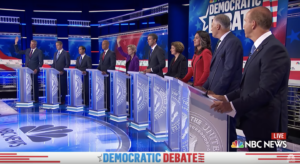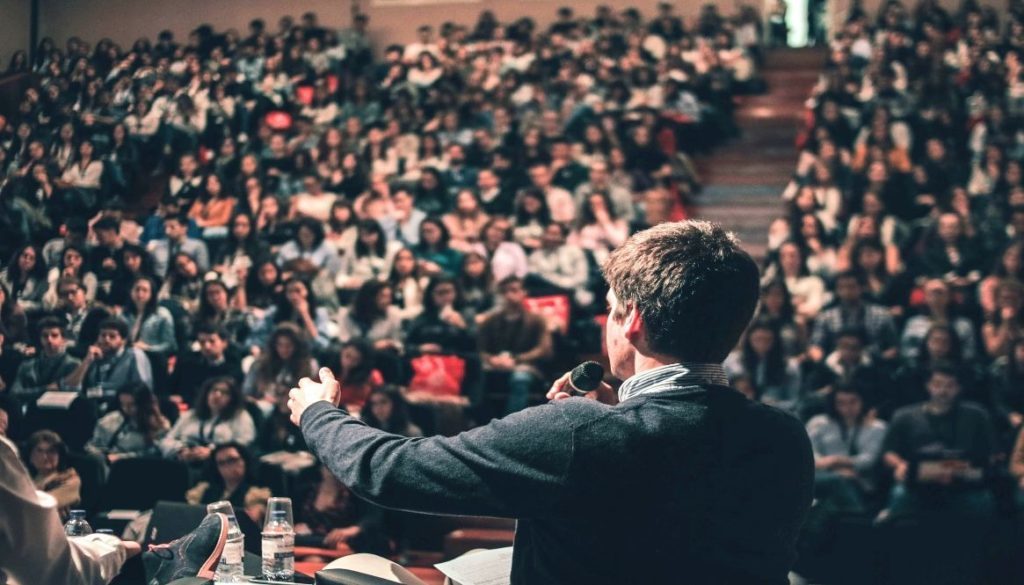In Review of the First Democratic Debates
For two nights last week, the opening round of debates in the 2020 Democratic presidential primary race took place, featuring a diverse field of twenty candidates contending for the opportunity to run against likely incumbent Donald Trump. As an uncertain voter heading into the next election, I took it upon myself to perform my civil due diligence and watch the parade of ten candidates debate each night as an introduction to a wide field that I personally haven’t yet taken the opportunity to research thoroughly.
After watching the first round of debates (first of twelve by the way… buckle up everyone), I came to the pretty quick conclusion that something, or more likely many things need to change. While I certainly learned a fair amount about a majority of the candidates from the two nights, either regarding a person’s character or their projected policies, I’m left with more questions than I received answers. I’ll be the first one to admit that I’m not much of a political savant, but I also believe you shouldn’t have to be an expert to contribute as an educated member of the public.
I’ve taken some time to consider all that I consumed over those two nights, and put together a few proposals that might improve the current debate format:
Adjust the qualifications of who gets to the debate stage.
At the risk of sounding inconsiderate, I must address the elephant (donkey?) in the room. Twenty is a ridiculous number of candidates for a voter to try and care about. Even when split into two groups of ten, the two-hour timeframe of the debate allows for a maximum of 12 minutes per candidate – the actual number likely being much lower due to designated moderator time, audience noise, and technical malfunctions. It was 15 minutes into the debate before everyone on stage finally had a chance to speak, and the second night was even longer at 25 minutes. I have two initial ideas to address this issue:
- Raise the required polling number to get on stage by a couple of points.
Provided here are the current required qualifications for a candidate to get on stage. If instead candidates were required to obtain say a minimum 4% of the primary polls, that would decrease the number of candidates on stage to just seven: Biden, Sanders, Warren, Harris, Booker, O’Rourke, and Buttigieg hit that mark across various polls taken from FiveThirtyEight before the debates began. If you’re a fan of even numbers, you could lower the necessary percentage until you reached 8 candidates: four each night, or two nights of all eight. With less time designated to those candidates representing a fraction of a percentage in the polls, voters could have more time with those that are likely to proceed through to the next rounds anyways.
- Allow a handful of favorites to automatically advance and hold an “undercard” debate.
I personally am more in favor of this suggestion in contrast to my previous idea. I don’t have a problem with hearing from some of the lower rated candidates, I actually think allowing voters to get acquainted with some of the more unheralded potential nominees has a lot of benefits. Pitting some of the lesser-known candidates against each other could garner momentum for a worthy up-and-comer or conversely poke holes in the prospects of candidates that really don’t belong. Either way, following the undercard debates, the DNC could then raise the polling requirements to get on stage – importantly, not before giving voters ample time to weigh all of the options.
Allow more time for answers, follow-ups, and spirited back-and-forths.
At the beginning of each night, the moderators introduced the format as a standard question and answer panel allowing sixty seconds for initial answers, and thirty seconds for potential follow-ups. If you’ve ever heard a politician answer a question, you could correctly assume that most have a difficult time adhering to those debate guidelines; however, there is blame to be had on both sides. In the same way that it’s unfair for a voter to be expected to make a preliminary judgment of a candidate off of several 45-second soundbites, it’s also unfair for the candidates to be expected to answer questions that are frequently complicated and nuanced in that same time period.
Perhaps the most clipped moment of the night was the emotional exchange between Senator Kamala Harris and former Vice President Joe Biden. The recent issue of Biden’s comments towards a few former segregationist-era senators struck a personal chord with Harris, and she was allowed upwards of two to three minutes to address – a classy move by NBC, in my opinion, to let this play out. Equally as important as letting her confront the former VP’s comments, Biden was allowed to respond – again not being checked by the originally established guidelines. Harris then was able to respond to Biden. At this point it was halfway through the second night of debate, and also the very first time I found myself gripped to the tv. It maintains status as one of the most commonly clipped moments a few days later because it was one of the few raw, powerful moments. Had the moderators tried to steer the conversation as they had been doing previously, Kamala Harris probably wouldn’t be polling as high as she is now, pretty safely assuming her increase in popularity is related to her deemed success in that exchange.
My point through all of this is that I believe debates are supposed to be substantial. It’s hard to follow the developing conversation when there are people calling back to claims made five, even ten minutes previous, after other points have been made because a candidate wasn’t allowed a chance to speak. In the midst of the convolution, there was one notable feature of the debates that I found welcome. It came across as silly to me at first, but there were a few moments spanning the two nights where the moderator halted conversation to ask for each candidate to answer a specific question by raising their hand or not. Here’s what it looked like in action:

The first time it was employed I thought it felt elementary, and then two candidates raised their hands opposing the other eight. Being one who raised her hand, Elizabeth Warren was immediately asked to explain her position, and then members of the opposition responded. I immediately changed my opinion of the moderator’s methodology – he successfully provided a clear distinction between every candidate on stage, and immediately got to the root of the issue as to why there is a difference of opinion. If the DNC is really asking voters to try to align twenty candidates within all of their individual policies, directly splitting the stage into groups seemed to be an effective way to promote both exposure for and a distinction between candidates.
In addition to some of the more pressing issues with the format, I’ve compiled a few additional constructive criticisms that if addressed could improve the overall debate experience.
- Get rid of the audience entirely. As meaningful as it may be for someone to attend an event of this nature, they contribute essentially nothing but pointless noise that wastes a pretty significant amount of time. Contestants are often interrupted by cheering, and when time is as limited as it has been, every second is important.
- Moderate the moderators. I’m being strict on this one. Overall, I thought the moderators did a moderately (yes, I did) competent job, especially for one that is so highly scrutinized. Nonetheless, on a few occasions, I did find myself expecting a little more from them. More often than not, they let non-answers go unchecked – which I understand is likely a product of time limits, but it gets frustrating to listen to a carefully curated question that addresses a pivotal issue be totally disregarded.
- Clean up technical issues. In the opinion of an average viewer like myself, the technical glitch with the moderators’ microphones on the first night wasn’t that huge of a deal. Halfway through the debate, the second group of moderators came in to replace the first. Shortly after the swap, muffled voices could be heard all throughout the auditorium making it difficult for candidates to hear any questions – turns out, the microphones from the previous group hadn’t been turned off correctly. NBC quickly cut to commercial to address the issue, and not long after, the debate continued with no real harm done. Keeping all of that in mind, it still came across as amateur, which is never ideal. You can bet there are some media executives out there who will wake up in a cold sweat thanking whoever they can that it wasn’t their network that made this mistake.
If you have ever been part of a debate team in a competitive format, you’d quickly realize that the content NBC showed over those two nights could hardly be considered as an actual debate. I’m aware that many of my proposals are preliminary and quite unlikely to be seen in practice. The prevalent short attention span sparked by today’s “soundbite” culture (which I am very guilty of) has reduced genuine, lively debate to what we have today: a WWE-style show match that aims to inspire headlines and controversy.
I believe we are better than that. I know for a fact that candidates have more to offer – at least the ones who rightfully belong. My plan is undoubtedly not a perfect one, but I think there is merit in contributing an opinion to the conversation, it’s at the very least a starting point to build from. While the primaries rage on and blows are traded back-and-forth between candidates, I humbly suggest taking a few moments to carefully consider if we as a country should be content – should be proud – of the standards that we as a society have put in place for ourselves. I for one remain cautiously hopeful for the future; the future of public discourse, specifically, wields an ever-growing power to impact the rationale of voters across the country – I hope we can push for a positive impact.
“The tragedy of life is not found in failure but complacency. Not in you doing too much, but doing too little. Not in you (sic) living above your means, but below your capacity. It’s not failure but aiming too low, that is life’s greatest tragedy.” – Benjamin E. Mays
